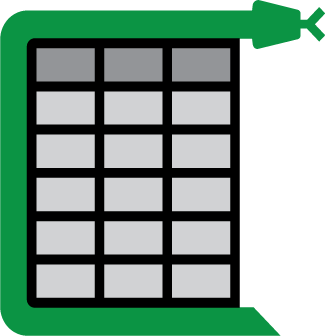Camelot is a Python library that makes it easy for anyone to extract tables from PDF files!
Note: You can also check out Excalibur, which is a web interface for Camelot!
Here's how you can extract tables from PDF files. Check out the PDF used in this example here.
>>> import camelot
>>> tables = camelot.read_pdf('foo.pdf')
>>> tables
<TableList n=1>
>>> tables.export('foo.csv', f='csv', compress=True) # json, excel, html, sqlite
>>> tables[0]
<Table shape=(7, 7)>
>>> tables[0].parsing_report
{
'accuracy': 99.02,
'whitespace': 12.24,
'order': 1,
'page': 1
}
>>> tables[0].to_csv('foo.csv') # to_json, to_excel, to_html, to_sqlite
>>> tables[0].df # get a pandas DataFrame!
| Cycle Name | KI (1/km) | Distance (mi) | Percent Fuel Savings | |||
|---|---|---|---|---|---|---|
| Improved Speed | Decreased Accel | Eliminate Stops | Decreased Idle | |||
| 2012_2 | 3.30 | 1.3 | 5.9% | 9.5% | 29.2% | 17.4% |
| 2145_1 | 0.68 | 11.2 | 2.4% | 0.1% | 9.5% | 2.7% |
| 4234_1 | 0.59 | 58.7 | 8.5% | 1.3% | 8.5% | 3.3% |
| 2032_2 | 0.17 | 57.8 | 21.7% | 0.3% | 2.7% | 1.2% |
| 4171_1 | 0.07 | 173.9 | 58.1% | 1.6% | 2.1% | 0.5% |
There's a command-line interface too!
Note: Camelot only works with text-based PDFs and not scanned documents. (As Tabula explains, "If you can click and drag to select text in your table in a PDF viewer, then your PDF is text-based".)
- You are in control.: Unlike other libraries and tools which either give a nice output or fail miserably (with no in-between), Camelot gives you the power to tweak table extraction. (This is important since everything in the real world, including PDF table extraction, is fuzzy.)
- Bad tables can be discarded based on metrics like accuracy and whitespace, without ever having to manually look at each table.
- Each table is a pandas DataFrame, which seamlessly integrates into ETL and data analysis workflows.
- Export to multiple formats, including JSON, Excel, HTML and Sqlite.
See comparison with other PDF table extraction libraries and tools.
The easiest way to install Camelot is to install it with conda, which is a package manager and environment management system for the Anaconda distribution.
$ conda install -c conda-forge camelot-py
After installing the dependencies (tk and ghostscript), you can simply use pip to install Camelot:
$ pip install camelot-py[cv]
After installing the dependencies, clone the repo using:
$ git clone https://www.github.com/camelot-dev/camelot
and install Camelot using pip:
$ cd camelot $ pip install ".[cv]"
Great documentation is available at http://camelot-py.readthedocs.io/.
The Contributor's Guide has detailed information about contributing code, documentation, tests and more. We've included some basic information in this README.
You can check the latest sources with:
$ git clone https://www.github.com/camelot-dev/camelot
You can install the development dependencies easily, using pip:
$ pip install camelot-py[dev]
After installation, you can run tests using:
$ python setup.py test
Camelot uses Semantic Versioning. For the available versions, see the tags on this repository. For the changelog, you can check out HISTORY.md.
This project is licensed under the MIT License, see the LICENSE file for details.












